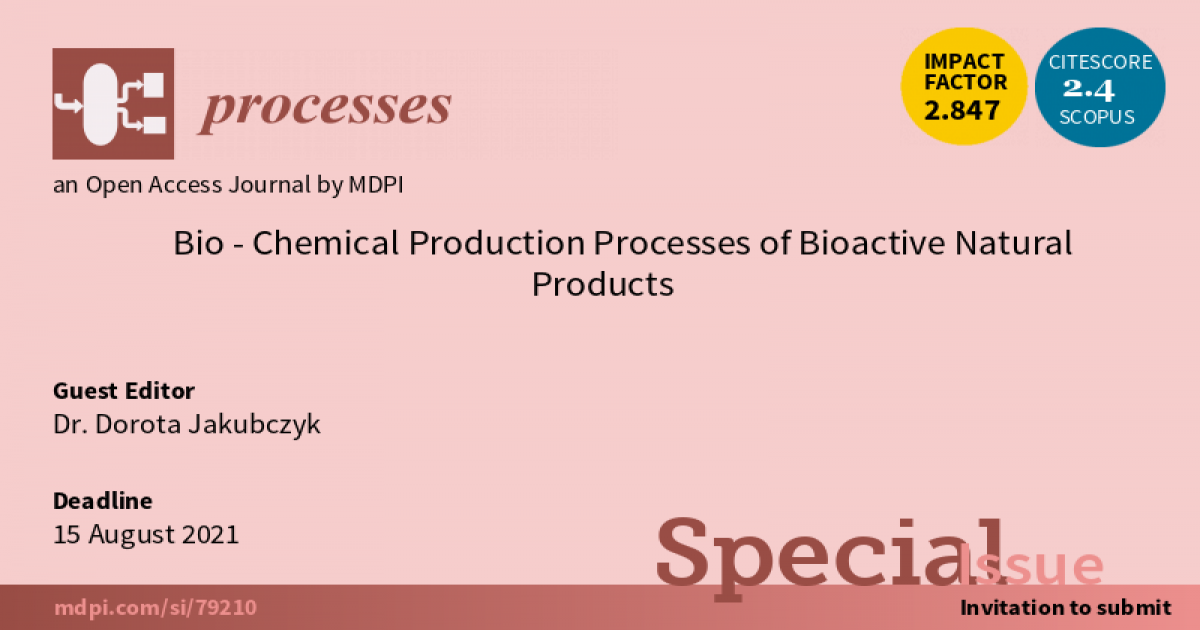- 2.8Impact Factor
- 5.5CiteScore
- 15 daysTime to First Decision
Bio-Chemical Production Processes of Bioactive Natural Products
This special issue belongs to the section “Biological Processes and Systems“.
Special Issue Information
Dear Colleagues,
Nowadays, one of the greatest global challenges is development of new anticancer and antimicrobial drugs, especially due to an increasing phenomena of multidrug resistance organisms, newly emerged pathogens and increasing number of cancer related diseases. SARS-CoV-2 pandemic is an example of how important the development of new antimicrobial drugs is.
Natural products are a rich source of new drugs as they constitute more than two-thirds of clinically used antibiotics and 50% of anticancer drugs. However, in most cases genuine natural products cannot be used directly as medicines due to toxic side effects or suboptimal pharmacokinetics. In order to improve the pharmacological properties of these compounds, including bioactivity and stability, or to produce better precursors of semi-synthetic pathways, unnatural derivatives should be made, for example from natural products of fungal or bacterial origin.
Concerning synthetic biology in the natural product bio-production, much has been done using a model organism, Saccharomyces cerevisiae, because of its great toolkit in genomic manipulation. However, because of some limitations with S. cerevisiae system for instance with toxicity of the newly engineered and produced metabolites or time-consuming protocols, new approaches are required.
Biotransformation is a process by which organic compounds are transformed from one form to another, aided by organisms such as bacteria or fungi and by their enzymes. Side reactions lead to unwanted products and the treatment of the (desired) product can be complex and involve multi-step procedures such as biomass removal or extraction of the culture fluid. Extraction of biotransformation products is undoubtedly an ambitious task, although scaling-up the production and using the state-of-the-art techniques such as high performance liquid chromatography combined with high resolution mass spectrometry, can enable this task.
This special issue on “Processes of Bio-Chemical Production of Bioactive Natural Products” aims to review novel advances in the development of new methods of bio-chemical production of bioactive natural products and their analogues. Topics include, but are not limited to:
- Synthetic biology tools in bio-production of natural products derivatives
- Chemical synthesis and semi-synthesis of natural products
- Modifications by biotransformation
- Alternative methods for bio-chemical production of natural products
- Processes / mechanisms of bio-chemical production
Guest Editor
Manuscript Submission Information
Manuscripts should be submitted online at www.mdpi.com by registering and logging in to this website. Once you are registered, click here to go to the submission form. Manuscripts can be submitted until the deadline. All submissions that pass pre-check are peer-reviewed. Accepted papers will be published continuously in the journal (as soon as accepted) and will be listed together on the special issue website. Research articles, review articles as well as short communications are invited. For planned papers, a title and short abstract (about 250 words) can be sent to the Editorial Office for assessment.
Submitted manuscripts should not have been published previously, nor be under consideration for publication elsewhere (except conference proceedings papers). All manuscripts are thoroughly refereed through a single-blind peer-review process. A guide for authors and other relevant information for submission of manuscripts is available on the Instructions for Authors page. Processes is an international peer-reviewed open access semimonthly journal published by MDPI.
Please visit the Instructions for Authors page before submitting a manuscript. The Article Processing Charge (APC) for publication in this open access journal is 2400 CHF (Swiss Francs). Submitted papers should be well formatted and use good English. Authors may use MDPI's English editing service prior to publication or during author revisions.
Keywords
- Bioactive natural products
- Synthetic biology
- Biotransformation
- Semi-synthesis
- Bio-chemical production
- Processes

Benefits of Publishing in a Special Issue
- Ease of navigation: Grouping papers by topic helps scholars navigate broad scope journals more efficiently.
- Greater discoverability: Special Issues support the reach and impact of scientific research. Articles in Special Issues are more discoverable and cited more frequently.
- Expansion of research network: Special Issues facilitate connections among authors, fostering scientific collaborations.
- External promotion: Articles in Special Issues are often promoted through the journal's social media, increasing their visibility.
- Reprint: MDPI Books provides the opportunity to republish successful Special Issues in book format, both online and in print.


